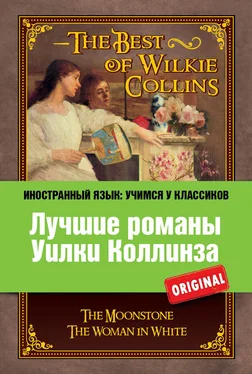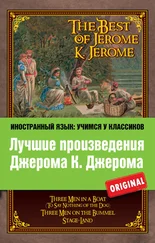As for me, I went on with my business as bailiff year after year up to Christmas 1847, when there came a change in my life. On that day, my lady invited herself to a cup of tea alone with me in my cottage. She remarked that, reckoning from the year when I started as page-boy in the time of the old lord, I had been more than fifty years in her service, and she put into my hands a beautiful waistcoat of wool that she had worked herself, to keep me warm in the bitter winter weather.
I received this magnificent present quite at a loss to find words to thank my mistress with for the honour she had done me. To my great astonishment, it turned out, however, that the waistcoat was not an honour, but a bribe. My lady had discovered that I was getting old before I had discovered it myself, and she had come to my cottage to wheedle me (if I may use such an expression) into giving up my hard out-of-door work as bailiff, and taking my ease for the rest of my days as steward in the house. I made as good a fight of it against the indignity of taking my ease as I could. But my mistress knew the weak side of me; she put it as a favour to herself. The dispute between us ended, after that, in my wiping my eyes, like an old fool, with my new woollen waistcoat, and saying I would think about it.
The perturbation in my mind, in regard to thinking about it, being truly dreadful after my lady had gone away, I applied the remedy which I have never yet found to fail me in cases of doubt and emergency. I smoked a pipe and took a turn at ROBINSON CRUSOE. Before I had occupied myself with that extraordinary book five minutes, I came on a comforting bit (page one hundred and fifty-eight), as follows: “To-day we love, what to-morrow we hate.” I saw my way clear directly. To-day I was all for continuing to be farm-bailiff; to-morrow, on the authority of ROBINSON CRUSOE, I should be all the other way. Take myself to-morrow while in to-morrow’s humour, and the thing was done. My mind being relieved in this manner, I went to sleep that night in the character of Lady Verinder’s farm bailiff, and I woke up the next morning in the character of Lady Verinder’s house-steward. All quite comfortable, and all through ROBINSON CRUSOE!
My daughter Penelope has just looked over my shoulder to see what I have done so far. She remarks that it is beautifully written, and every word of it true. But she points out one objection. She says what I have done so far isn’t in the least what I was wanted to do. I am asked to tell the story of the Diamond and, instead of that, I have been telling the story of my own self. Curious, and quite beyond me to account for. I wonder whether the gentlemen who make a business and a living out of writing books, ever find their own selves getting in the way of their subjects, like me? If they do, I can feel for them. In the meantime, here is another false start, and more waste of good writing-paper. What’s to be done now? Nothing that I know of, except for you to keep your temper, and for me to begin it all over again for the third time.
The question of how I am to start the story properly I have tried to settle in two ways. First, by scratching my head, which led to nothing. Second, by consulting my daughter Penelope, which has resulted in an entirely new idea.
Penelope’s notion is that I should set down what happened, regularly day by day, beginning with the day when we got the news that Mr. Franklin Blake was expected on a visit to the house. When you come to fix your memory with a date in this way, it is wonderful what your memory will pick up for you upon that compulsion. The only difficulty is to fetch out the dates, in the first place. This Penelope offers to do for me by looking into her own diary, which she was taught to keep when she was at school, and which she has gone on keeping ever since. In answer to an improvement on this notion, devised by myself, namely, that she should tell the story instead of me, out of her own diary, Penelope observes, with a fierce look and a red face, that her journal is for her own private eye, and that no living creature shall ever know what is in it but herself. When I inquire what this means, Penelope says, “Fiddlesticks!” I say, Sweethearts.
Beginning, then, on Penelope’s plan, I beg to mention that I was specially called one Wednesday morning into my lady’s own sitting-room, the date being the twenty-fourth of May, Eighteen hundred and forty-eight.
“Gabriel,” says my lady, “here is news that will surprise you. Franklin Blake has come back from abroad. He has been staying with his father in London, and he is coming to us to-morrow to stop till next month, and keep Rachel’s birthday.”
If I had had a hat in my hand, nothing but respect would have prevented me from throwing that hat up to the ceiling. I had not seen Mr. Franklin since he was a boy, living along with us in this house. He was, out of all sight (as I remember him), the nicest boy that ever spun a top or broke a window. Miss Rachel, who was present, and to whom I made that remark, observed, in return, that SHE remembered him as the most atrocious tyrant that ever tortured a doll, and the hardest driver of an exhausted little girl in string harness that England could produce. “I burn with indignation, and I ache with fatigue,” was the way Miss Rachel summed it up, “when I think of Franklin Blake.”
Hearing what I now tell you, you will naturally ask how it was that Mr. Franklin should have passed all the years, from the time when he was a boy to the time when he was a man, out of his own country. I answer, because his father had the misfortune to be next heir to a Dukedom, and not to be able to prove it.
In two words, this was how the thing happened:
My lady’s eldest sister married the celebrated Mr. Blake – equally famous for his great riches, and his great suit at law. How many years he went on worrying the tribunals of his country to turn out the Duke in possession, and to put himself in the Duke’s place – how many lawyer’s purses he filled to bursting, and how many otherwise harmless people he set by the ears together disputing whether he was right or wrong – is more by a great deal than I can reckon up. His wife died, and two of his three children died, before the tribunals could make up their minds to show him the door and take no more of his money. When it was all over, and the Duke in possession was left in possession, Mr. Blake discovered that the only way of being even with his country for the manner in which it had treated him, was not to let his country have the honour of educating his son. “How can I trust my native institutions,” was the form in which he put it, “after the way in which my native institutions have behaved to ME?” Add to this, that Mr. Blake disliked all boys, his own included, and you will admit that it could only end in one way. Master Franklin was taken from us in England, and was sent to institutions which his father COULD trust, in that superior country, Germany; Mr. Blake himself, you will observe, remaining snug in England, to improve his fellow-countrymen in the Parliament House, and to publish a statement on the subject of the Duke in possession, which has remained an unfinished statement from that day to this.
There! thank God, that’s told! Neither you nor I need trouble our heads any more about Mr. Blake, senior. Leave him to the Dukedom; and let you and I stick to the Diamond.
The Diamond takes us back to Mr. Franklin, who was the innocent means of bringing that unlucky jewel into the house.
Our nice boy didn’t forget us after he went abroad. He wrote every now and then; sometimes to my lady, sometimes to Miss Rachel, and sometimes to me. We had had a transaction together, before he left, which consisted in his borrowing of me a ball of string, a four-bladed knife, and seven-and-sixpence in money – the colour of which last I have not seen, and never expect to see again. His letters to me chiefly related to borrowing more. I heard, however, from my lady, how he got on abroad, as he grew in years and stature. After he had learnt what the institutions of Germany could teach him, he gave the French a turn next, and the Italians a turn after that. They made him among them a sort of universal genius, as well as I could understand it. He wrote a little; he painted a little; he sang and played and composed a little – borrowing, as I suspect, in all these cases, just as he had borrowed from me. His mother’s fortune (seven hundred a year) fell to him when he came of age, and ran through him, as it might be through a sieve. The more money he had, the more he wanted; there was a hole in Mr. Franklin’s pocket that nothing would sew up. Wherever he went, the lively, easy way of him made him welcome. He lived here, there, and everywhere; his address (as he used to put it himself) being “Post Office, Europe – to be left till called for.” Twice over, he made up his mind to come back to England and see us; and twice over (saving your presence), some unmentionable woman stood in the way and stopped him. His third attempt succeeded, as you know already from what my lady told me. On Thursday the twenty-fifth of May, we were to see for the first time what our nice boy had grown to be as a man. He came of good blood; he had a high courage; and he was five-and-twenty years of age, by our reckoning. Now you know as much of Mr. Franklin Blake as I did – before Mr. Franklin Blake came down to our house.
Читать дальше
Конец ознакомительного отрывка
Купить книгу












